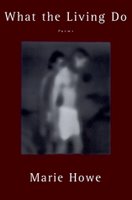Book Report: What the Living Do by Marie Howe
 Doug recommended I read Howe's The Good Thief, but What the Living Do turned out to be at my local library, so I got that.
Doug recommended I read Howe's The Good Thief, but What the Living Do turned out to be at my local library, so I got that. The poems in the book mostly center around the death of Howe's brother. She takes the elegy and explores its possibilities. She writes about his sickness, his near recoveries, his eventual death, and what happens afterwards.
As a form, I think the elegy is fine. Donald Hall's best book (of the few I've read) is Without, about Jane Kenyon's death. But Hall proved with its follow-up, The Painted Bed, that the elegy can go wrong quickly. I think a book-length study of a family member's death opens up too many possibilities for sentimentality and meaningless nostalgia. This is the weakest aspect of Howe's book. Too often, she recounts happy family memories, attempting to drench them with meaning by juxtaposing the brother's present day suffering. It's a boring, tired conceit, and Howe doesn't add anything to it.
The tiredness of subject isn't helped by Howe's style. She's a verbose poet, one of many current American poets who write with no apparent attention to language, rhythm, or concision. There's a frustrating abundance of unnecessary prepositions, conjunctions, definite and indefinite articles. For example, this opening to "For Three Days": "For three days now I've been trying to think of another word for gratitude / because my brother could have died and didn't." Every poem is as wordy as this line. There's no economy of language.
Having said all that, there are some strong poems here. To appreciate them, you have to look independently of the book, and ignore any stylistic complaints.
"Practicing" is a saucy little poem about girls discovering about sex with boys by trying things out between each other. It sounds a bit like a teen reading book, but it works as a poem. It ends with "I want to write a song // for that thick silence in the dark, and the first pure thrill of unreluctant desire, / just before we made ourselves stop."
Then there's "Separation," about seeing her ex in a Brooks Pharmacy parking lot. She asks, "How is it possible that I am allowed to see him / like this ... what he wears in the world without me, / his hands swinging by his side, his cock quiet // in his jeans, his shirt covering / his shoulders, his own tongue in his mouth." The word "own" in the last line is terrifically placed. That's an attention to language I wish happened more often.
Lastly, "In the Movies" is one of my favorites. She makes a bit of an odd transition between her brother and his friends playing PIG in the driveway and how soldiers in movies rape a woman. What's effective is how she follows the woman after the detailed description of the rape, years later "She's dignified and serene. Maybe / her son has been recently killed, maybe she's successfully // married her daughter." And then this: "How can a woman love a man?" It's an evocative line full of depth and truth.
I think these three examples show how the best work in the book isn't about her brother's sickness and death, but relationships between men and women. She most profound, interesting, and thoughtful in those poems. Perhaps I'm too well read in elegies, and not well read enough in poems about sex. Well, next up is Anne Sexton's Selected Poems. That should balance me a bit.





0 Comments:
Post a Comment
<< Home